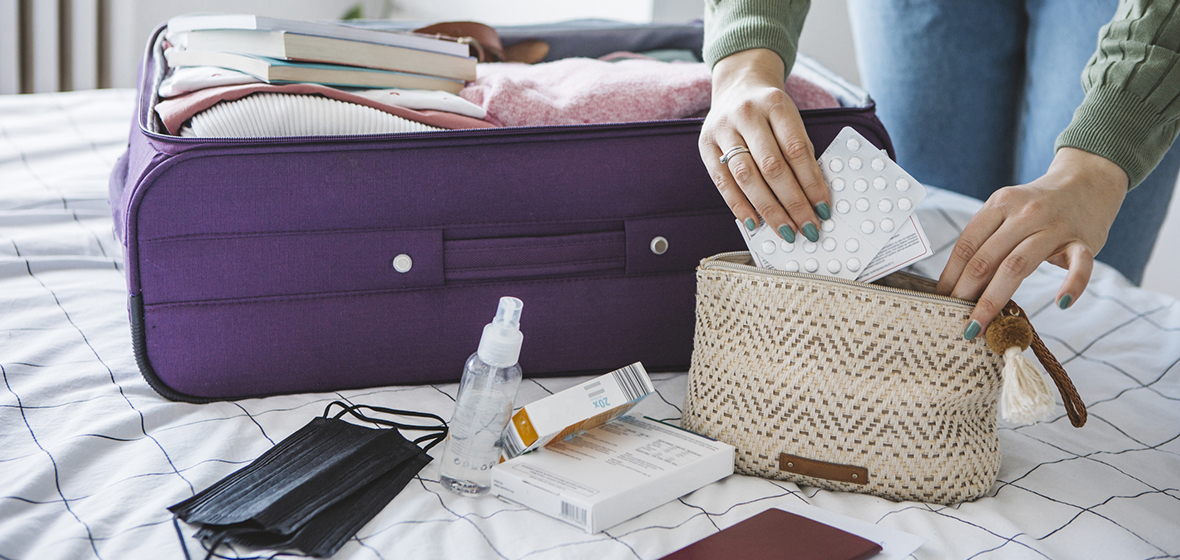
If you are planning a trip, whether it’s in the U.S. or abroad, you are likely thinking of clothes to pack, activities to do, food to eat and places and people to see. While all those are great to consider before traveling, you also need to consider any medications you regularly take if you travel. You will need to make sure you follow laws and regulations, as well as other tips to keep yourself safe and healthy while traveling.
Follow Medication Regulations
The Centers for Disease Control and Prevention has the following tips for traveling with medication:
- Some medications cannot be placed in a pill organizer and need to stay in their original, labeled containers. Ask your pharmacist if you are unsure whether your medications fall in this category.
- Only carry your own medications, not someone else’s.
- Bring copies of your prescriptions with you on your trip. Your pharmacist or prescribing medical provider can give you these copies if needed.
- Do not mail medications to your destination.
- If you are flying, make sure your medications are in your carry-on bag for easy access. If they are in your checked bag, you may not be able to access your medication if you have flight delays, cancellations or travel issues. If you have medications in your carry-on bag, they may not weigh more than 3.4 ounces or 100 milliliters, and they must be removed from your carry-on bag during security screening, according to the Transportation Security Administration.
- Know the medication-related laws in the place(s) you are visiting. Search online to find out about your destination country’s laws. Some countries may arrest you if you violate their medication-related laws, even if you have a valid prescription for the medication.
- If you visit another country and must get your medication at a pharmacy there, know that some medications have different names depending on the country.
- Example: acetaminophen (U.S.) is paracetamol (United Kingdom)
- Do not transport medications for recreational use.
Some medicines are banned in several countries. Medications that are banned in multiple countries include:
- Many opioids, including codeine, fentanyl, hydrocodone, methadone, morphine, oxycodone, tramadol and others
- Many psychotropic medications, including clozapine, diazepam, gabapentin, lorazepam, marijuana and others
- Controlled substances, including medicines containing cannabidiol (CBD), ephedrine, pseudoephedrine, testosterone and other substances
Make sure you check the rules for the country you are visiting so you will not be caught off guard.
Over-the-Counter Medications You May Want to Take
In addition to your prescribed medications, you may want to take some other medications with you when traveling to treat pain, discomfort or common illnesses you or the people you travel with may experience. These medications are commonly found over the counter. Medications you may want to pack include:
- Sleep aid: melatonin, diphenhydramine, doxylamine
- Fever or pain medicine: acetaminophen or ibuprofen
- Motion sickness medication: meclizine, Dramamine
- Laxative: bisacodyl, senna, polyethylene glycol
- Anti-diarrhea medication: loperamide
- Decongestant medication: pseudoephedrine, phenylephrine
- Cough drops
- Antihistamine: loratadine, cetirizine, diphenhydramine
- Antacid medication: TUMS, bismuth subsalicylate
Other Useful Tips
If your travel destination is in another time zone, talk to your pharmacist or prescribing medical provider beforehand to make a plan for when to take your prescribed medications. You may need to gradually change your medication schedule while you travel or start a new schedule once you get to your new time zone.
For all your medication you bring, make sure to bring enough for a few extra days. This could come in handy if there are any delays in your travel.
UofL Health is Here for You
If you are planning a trip, have medication questions and need a primary care provider, you can call UofL Physicians – Primary Care at 502-588-4343 to make an appointment. You can also visit one of the following UofL Health – Pharmacy locations to get your medication questions answered:
- UofL Health – UofL Hospital: 502-562-3571
- UofL Health – Jewish Hospital: 502-569-7902
- UofL Health – Mary & Elizabeth Hospital: 502-367-3315
- UofL Health – Specialty Pharmacy: 502-681-1600









